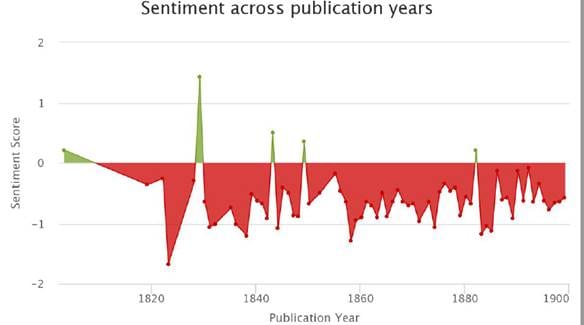A new tool available through the Libraries makes it easier than ever for scholars to try their hands at digital humanities analysis.
Often, large and complex analysis projects require scholars to do their own coding in languages like Python or R, but the Digital Scholar Lab, from educational publisher Gale, is an out-of-the-box tool that can analyze a large set of documents without requiring the user to know any code at all. Its user-friendly interface is designed for beginners getting used to the fundamentals of digital humanities projects — or for more experienced users to get a quick, early glimpse of potential outcomes for a project.
“The key thing is that even if you’re not a programmer, you can start an analysis right now,” said research librarian Geoff Morse. “You don’t need to write new code yourself.”

A basic analysis by the Digital Scholar Tool on 500 19th century newspaper articles measuring sentiments about the term “war”
The Digital Scholar Lab can carry out common text-mining tasks like sentiment analysis (which quantifies subjective attitudes and opinions in large bodies of text) and topic modeling (which finds language commonalities between multiple documents). The results are rendered in a graphic visualization that helps researchers analyze their results. The tool has access to millions of digitized primary source documents published by Gale, from newspapers to archival papers, and because it resides in the cloud, it doesn’t require the user to download software
“Researchers who are just starting out in their research might feel overwhelmed by the scope of this kind of work,” Morse said. “This tool offers a straightforward interface and easy access to a large content set.”
Morse said librarians are eager to talk with faculty and student researchers about new and inventive ways to experiment with the Digital Scholar Lab. Contact Morse directly to learn more.
